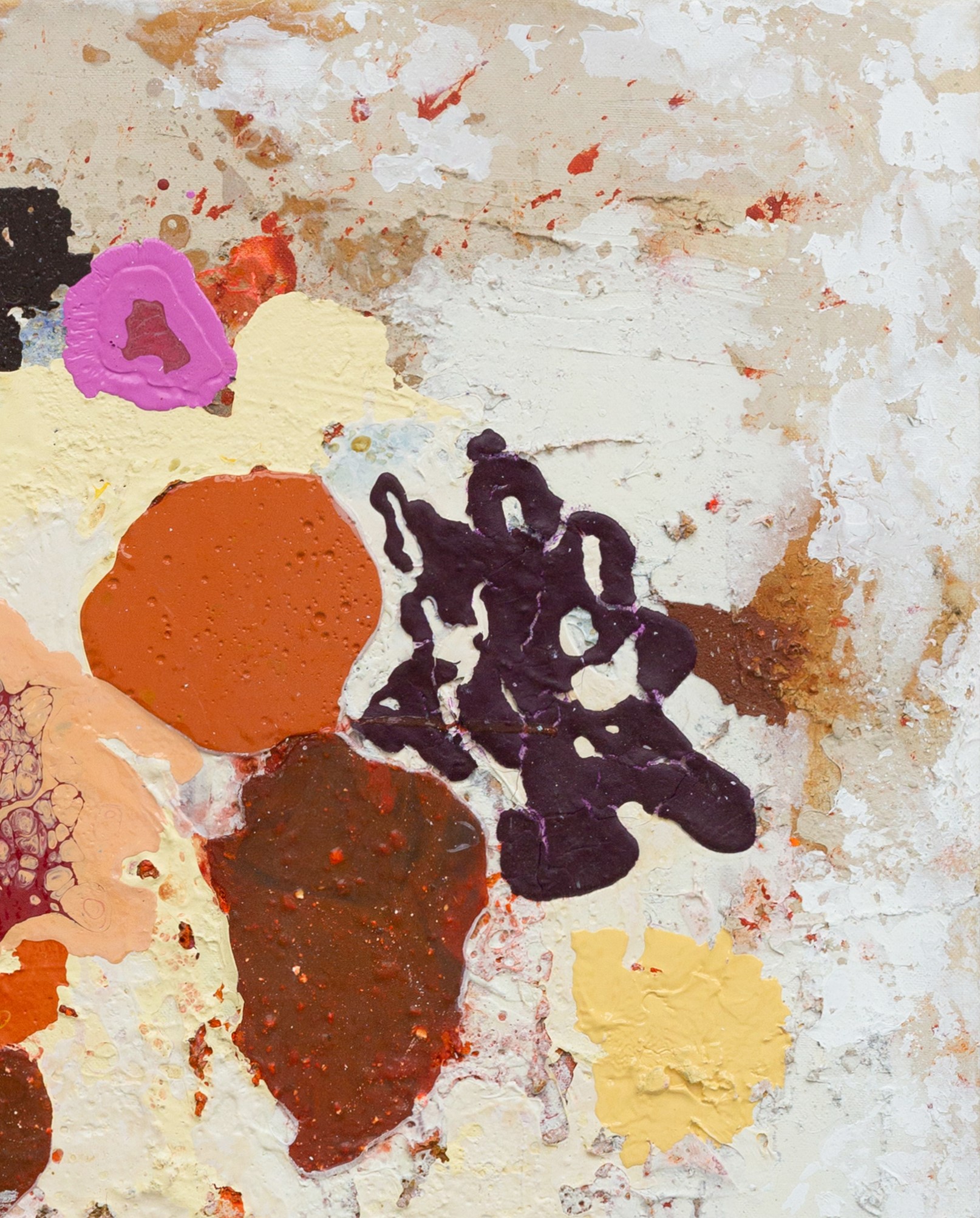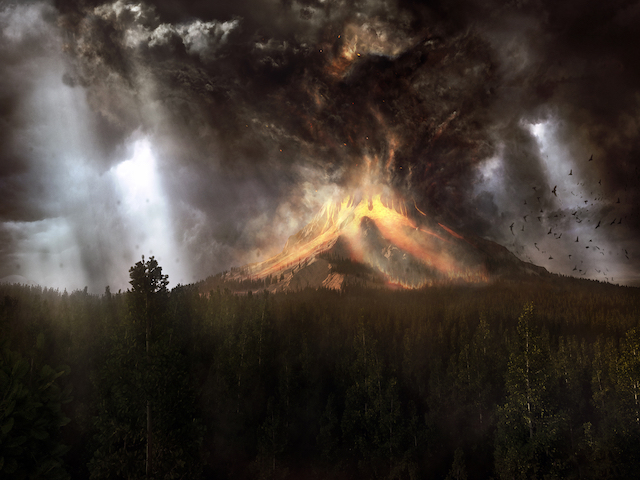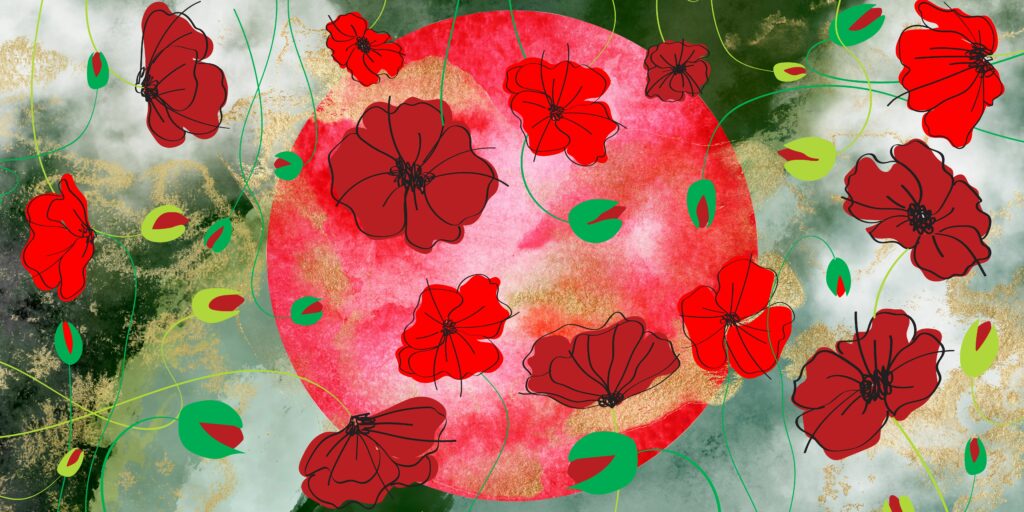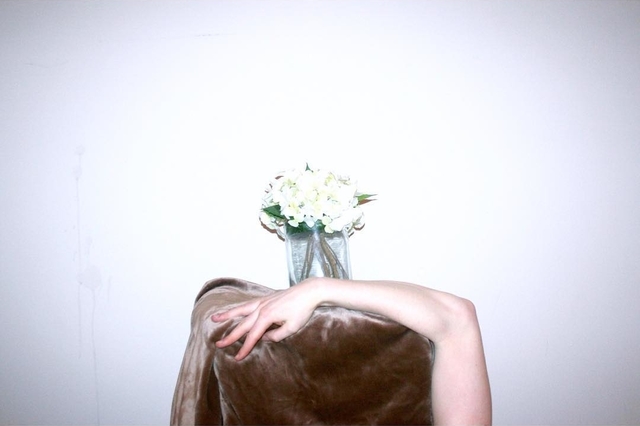A familial haunting returns a Palestinian writer to Arabic.

April 26, 2023
This essay is part of Transpacific Literary Project’s monthly column, with art by Mit Jai Inn.
In the morning, as always, I question my sanity.
It has only been a few weeks since I began dreaming vividly of my dead grandmother, less than a month since I began pouring those dreams into untitled Google Docs. For days, they have pooled as blue screenglow in the predawn dark, my furtive fingers typing almost independently of me. I write, half-conscious, until the sun crests the brownstones outside my third-story window, its gold light vaporizing my haze.
It is 2020, a heaving and hot July. I have spent the year in a locked-down New York City, feverish with virus-fear, marching in grief-soaked streets. My body vibrates in unanchored time, my psyche stretching to hold the strangeness, the isolation, the planetary fury and dread. And so, each morning as my fingers slow, I hesitate to peek at what I’ve typed. Each time, I fear I’ll discover gibberish, confirmation of my slipping mind.
Yet what emerges in the typo-ridden paragraphs is beautiful, if surprising, to me. It is all her, my grandmother, a decade buried, but vivid, palpable, in this text. There she is, cross-legged on the kitchen floor of my childhood home in Illinois, chiming Arabic nursery songs as she kneads breakfast dough. There she is, teasing me in our fala7i dialect as she beats me at cards or tosses another piece of chicken into my rice-flecked hands. And there I am, speaking back to her, my tongue slipping seamlessly between Arabic and English, never noticing the borders that would soon bisect my life.
When I first tell my partner I am writing about her, I pause to ask if he’s ever heard me say her name. We called her Sittoo, I explain. Sittoo—it’s an old word, meaning my honored lady. As a child, I found the word felt odd, squishy in my mouth. Do we call her Sitt-oo because she can’t walk? A few years later, I came to dislike the word, just as I disliked all things that made me feel different from my Midwestern peers. English annexed my Arabic on countless, uncounted fronts. Sittoo, one of the first casualties as I ceded to normal speech. Replaced by Grandmother, a term that did not inspire scrutiny, did not ask a grandchild to explain.
The word, now resurrected, envelopes me. Sittoo. ستو. As I speak it, I am lowered again into her lap, nested against her warm breasts, hearing her vocal chords skid and crack into a laugh. I see that old thobe of hers, the thin tan fabric stretched around her strong arms, the buttons I was convinced were solid gold. By night, I write each of these details as they reappear to me, a stream-of-consciousness archive of tiny, forgotten things. By daylight, the world continues to rumble and rage, democracy and justice questions stretched to breaking and beyond. But in these private, nocturnal trysts, my writing becomes a conjuring, an escape into a secret, hypnotic peace.
Then, a few weeks in, the spell is broken. My memory sputters, stumbles at the edges of what I can recall. Young and fused to the present tense, my experience of her was all immediacy, gestures, and viscerality. Replaying our domestic scenes in my head, I find there is a silence even inside our speech. No one told me of her past and I never imagined one. She seemed old enough to be beyond time, alien to youth.
Indeed, our family never knew her precise age. She was born one of four girls in rural Palestine under the British Mandate, a time and place no census bothered to record. Of course, I had no use for such details anyway—what did I care for biography, when I had her soft fingers in my hair, her succulent cooking in my mouth? As I grew, I mirrored history’s carelessness, incurious about her past while she still lived in our midst.
By age nine, we all moved to the Middle East, but she no longer lived with us. Our relationship became the stuff of Friday lunches, her small body crowded by her sons and dozens of their offspring. She seemed to always be shrinking after that—contorting with arthritis, crumbling with cancer, quieting as her sixty years of refugeedom seemed to catch up with her. Her last year, she rarely moved from her mat, rarely spoke except to groan of her pain or murmur prayers for those she’d lost.
Yet before she was Sittoo, she was Horea. Though I can scarcely think this thought, I know she was once younger than me. There was a time before she kneaded dough, a time a mother fed her bread. There was a day she blushed at the approach of a man named Musa. A day he broke her heart. Now, I thirst for more of her, overwhelmed by the expanse of the questions I never thought to ask. I turn to her son, my father, flooding him with voice memos, a cascade of audio messages begging for what he knows. What was her mother’s name? Which of her sons were born before the war? How did she end up alone?
It is only after I send a dozen of these memos that I wonder about his grief, if the sound of her name will hurt.
Neither of us quite notices when we shift out of English, my questions tapping beneath the decades of his carefully-practiced second tongue. His answers come fast and eager, and his voice, speaking in his particular mixture of southern Palestinian, Egyptian, and Gulf dialects, evokes the lineage of our survival. The lineage of our loss. We have slipped, too, from casual childhood memories into a full-fledged history. I fill a folder with his voice, naming each file—Leaving Gaza. First Year in Saudi. Family deaths, 1948.
I spend a winter with these recordings. My partner and I move apartments. I slowly roast at my new desk next to a boiler ticking with piped-in heat. Behind my screen, a window faces east onto a street pearled with snow. I treat this project like my journalism work: transcribe, timestamp, sort. I do not know yet that I am beginning a book, a memoir that will break and rebuild my heart. For now, I make myself a channel for my father’s sounds.
He retells stories I have heard before, in English—his first soccer ball, his impeccable high school grades. But now, in Arabic, familiar fables thicken, grow jagged and dense. It is in Arabic that he mentions his first shoes, a pair of flip-flops his mother bought for his first day of school. I double-check I’ve heard right—
ما كان عندك من قبل ؟!
No, before that I was barefoot.
He speaks of the joy of his first day, and his subsequent year at the UN-funded classroom. As he does, I brace myself for the story I know is coming next. When I heard it in English, it spanned a few, stiff sentences. My first-grade teacher was killed by the Israelis. We were under curfew when he died, so we couldn’t bury him. I can still remember the smell. Now, he elaborates, tells me the cause of death was the teacher’s despair: تجنن.
تجنن : Verb Form-V, the reflexive/passive.
Root: جن: to go dark, to be covered over, to descend.
To go mad.
تجنن: A refugee of nearly twenty years, my father’s teacher lost his mind hours into the war of 1967. He burst out of his besieged home, screaming, إرجع يا خنازير—get out of here, you pigs! The Israelis shot him through the chest.
اتضايقت is the word my father uses to describe a six-year-old’s grief. It is a word I feel in my chest, a breath-stealing, burning squeeze. I know a dictionary would render يتضايق as to be annoyed, but here it is something far more sinister. From the root ضيق, narrow, it is something more like choking, a stranglement. The dizziness of a collapsing sky. It’s the same word Mahmoud Darwish, our immortal poet, used to describe the aftermath of the same war:
تَضِيقُ بِنَا الأرْضُ تَحْشُرُنَا في المَمَرِّ الأخير , فَنَخْلعُ أَعْضَاءَنَا كَيْ نَمُرَّ
The Earth is closing in on us, pushing us through the final passage,
and we are tearing off our limbs to get through.
And my limbs feel it, too. As I let the stories in, my body is what holds them, medium for this alchemy of times and tongues. Each voice: a face, a world. Each word: a chord of possibilities, vibrations releasing in my flesh.
I listen, wait for the truest note to lodge between my bones. Next, I pluck at English words, comparing tones. Occasionally, I burst to my feet, shaking the tingle from my arms, pacing the hardwood floor in a churn of anger, grief, and thirst. The room around me vanishes. I am alone, walking a narrow plank through the past, a pilgrim or trespasser inside the lives of others. I dare not make a sound, and must not lose the thread.
It is from this affected body that I write. Some days, I writhe as I type, first hunching, then pivoting away while my fingers continue tapping keys. Stroke by stroke, I invent lines in English that harmonize with, but never capture, the first.
More than a year passes, and I am still on my grandmother’s trail. By now, my father and I have drawn her outline over and over, walked the concentric circles of his memory. We orbit her together, triangulating her youth, reanimating her motherhood of five children, then four. As I fumble towards this intimacy, I feel the texture of my inner landscape change. I begin thinking bilingually again, her voice and my own mingling in Arabic.
My spoken English slants, the syntax stretching, verbs and nouns jumping from one end of the sentence to the other. We go to his. Already I ate from it. My spelling grows phonetic, spare. I thot she baut it hear. I thought she bought it here. Most of all, I find Arabic words disrupting my English sentences—La, I was thinking we could go out, jaai balee pizza. // I am running late 3shan al train kharban.
For the first time since childhood, I allow my hybrid language to propagate, let my throat reflect the porousness I have always felt. I inform my partner, a non-Arab Jewish man, that I will no longer cordone myself off in English. That I will speak freely, in whatever vocabulary falls from my tongue. I am thankful for his adolescence spent in Iraq and Jordan, his ability to grasp most of what I say. As for the rest—he will learn.
Meanwhile, the second pandemic winter crawls on. The world of English grows, somehow, more grotesque, its violent rhetoric more literal. Capitol Hill is stormed. I watch with a sense of déjà vu, read a promise of no-relief. I duck into Arabic for hours every day. My secret portal, my escape. I am voracious—Arabic podcasts, Qur’an, news. Anything I can find to steep me in the sounds that housed my bygone innocence. Vibrations of an alternate world.
I supplement my father’s stories with books. I study archives compiled by Palestinian survivor-historians, efforts to un-erase their world. In one, I find my grandmother’s razed village, ‘Ibdis. From there, I gather scraps—its first appearance in Ottoman records (1596), the date of Zionist conquest (July 8, 1948), and its population that fateful year (626). I learn of its primary harvests—bulgur, honey, grapes. I try to translate these apparitions into prose.
My father and I enlist his older brother. He speaks only Arabic, his accent different from my father’s. Stranded in Jordan since 1968, he speaks its hearty dialect with inflections of the classical Arabic he studied in his youth. He can’t remember ‘Ibdis—he was only a baby when they fled. His memory blinks to life in the interim between ‘Ibdis and Gaza—seven years of sharecropping, sojourning with Bedouins on the edge of their lost land. He tells me of his father’s departure for Saudi Arabia, a search for work that would keep him away for the next twelve years. He vaguely remembers his little sister, who lived only six months.
By the time they arrive in Gaza, my Uncle’s voice grows precise. He pronounces the dimensions of their first home, which my grandmother built herself: مترين و نص، ميتر و نص. Two and a half meters by one and a half meters. Two cement rooms, only one with a finished floor. We slept on those tiles. Outside, in the sand, a table he used as a desk to study for his high school exams. Behind him, a fruitless banana tree and his mother’s pigeon coop.
On the other side of all those years, I take careful notes. I rewind to make sure I’ve heard correctly—was it one and a half meters by two, or two and a half? I handle each detail with reverence, awed by the granularity, the endless peculiarity, of a life. It is a reverence I lost for years. Allowing myself to be stripped not only of Arabic, but the world contained in our original word: Palestine.
It began when I was seven, when I started begging my friends to stay outside, in our yard. To not set foot in our home where they might stumble on my grandmother, barefoot on the kitchen floor—something their teasing taught me was uncouth. I learned to fear their mockery of her smell—garlic and roasting animals, harsh soap and old age—and their animalistic imitations of her Arabic.
After childhood teasing came the political shame. Before I hit middle school, I had already learned there were certain words that cast a spell. Palestine, Gaza, Muslim—in an instant, they make me disappear, replaced with an apparition of another’s imagining. I say Palestinian and become terrorist, or barbarian, or at the very least, suspect. I say Gaza, and what is heard is Hamas, dead Jews. Islam is oppressed women and extremism. At their utterance, conversations die, friendships pivot, the room itself seeming to tilt.
One by one, they taught me to seek relief in omission, in disguise. A college professor in Philadelphia, an Israeli flag on his desk. Eyeing my name, then my face, his lips parting into a frown. A warning trickling into my gut, a stomachache I carried back to my dorm. The coworker who told an entire dinner party, Palestinians don’t deserve a state arguing, they can’t even keep their streets clean. The white soldier who slapped my passport against the wall, after three interrogations and an eight-hour wait. You’re not entering Israel today. His un-reason: your last name.
The Orthodox friend who called me in the middle of the night, telling me, I’m scared, Sarah, I’m scared. I was helping organize a panel of Jewish critics of Zionism, prompting his friends to call me a Nazi. I stayed up late comforting him. It’s not about hate . . . it’s . . . a human rights issue . . . international law . . . decolonization. He asked me to disavow terrorism. Later, on the Sabbath, I walked across the city with him, while our other friends rode the train. He told me how much our friendship had surprised him. How unexpected, to discover I was kind, humane. I did not know what to say.
But now what I wish I had said is this: Gaza means a family that never made it off the UN housing waitlist. A boy with no shoes and a homemade soccer ball. The walls a young mother built, slowly, from mud and grit. The mangy cat they sheltered there. Palestine—an oasis, real and dreamed, shaded by بلح trees. Respite, even joy. The tenacity to stay. On the land. In this life. In history, and one more day.
The صمود we shouldn’t have to hold, but do.



